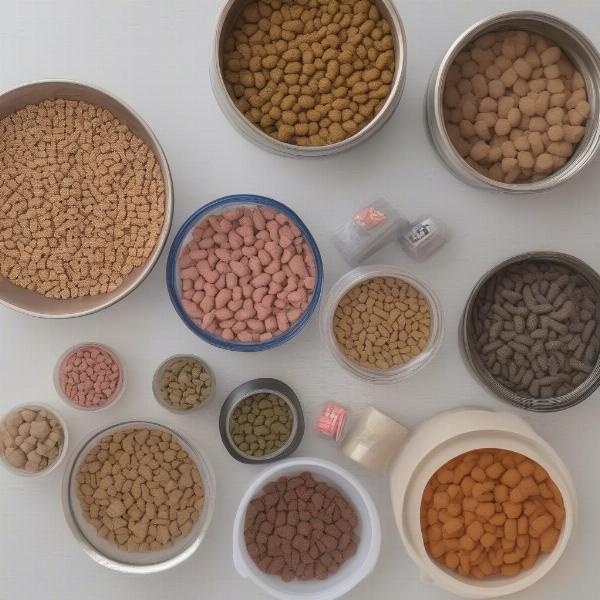Choosing the right dog food can be a daunting task, especially when it comes to our smaller canine companions. Small dogs have unique nutritional needs due to their higher metabolism, smaller stomachs, and often, pickier palates. This guide will delve into the essential factors to consider when selecting dog food for small dogs, ensuring your pint-sized pal receives the optimal nutrition for a long, healthy, and happy life.
Understanding the Nutritional Needs of Small Breeds
Small dog breeds burn energy faster than their larger counterparts, meaning they require a higher calorie density in their food. This doesn’t mean filling them up with empty calories, but rather, choosing nutrient-rich kibble formulated specifically for their size and metabolism. Look for foods with high-quality protein sources, healthy fats, and digestible carbohydrates.
Additionally, smaller mouths and teeth can make it challenging for some small breeds to handle large kibble. Opt for smaller kibble sizes designed for their petite jaws. This ensures they can comfortably chew and digest their food, preventing choking hazards and digestive upset.
Key Nutrients to Look for in Small Dog Food
When browsing the aisles of dog food, focus on these key nutrients essential for small breeds:
- Protein: High-quality animal-based protein sources like chicken, beef, lamb, or fish are crucial for muscle development and overall health.
- Fat: Healthy fats provide energy, support healthy skin and coat, and aid in nutrient absorption. Look for sources like fish oil, chicken fat, or flaxseed oil.
- Carbohydrates: Digestible carbohydrates offer a source of energy and fiber. Opt for whole grains, fruits, and vegetables.
- Vitamins and Minerals: Essential vitamins and minerals support various bodily functions, including immune system health, bone development, and nerve function.
Life Stage Considerations: Puppy, Adult, and Senior
Just like humans, a small dog’s nutritional needs change throughout their life.
Puppy Food for Small Breeds
Puppies require a higher calorie and nutrient density to support their rapid growth and development. Look for puppy food formulated for small breeds, offering smaller kibble sizes and a balanced nutrient profile.
Adult Dog Food for Small Breeds
Once your small dog reaches adulthood, switch to an adult formula designed to maintain their ideal weight and energy levels.
Senior Dog Food for Small Breeds
As your small dog enters their senior years, their metabolism slows down, and they may require a lower calorie diet. Senior formulas often contain added joint support supplements and other ingredients to address age-related health concerns.
 Different types of small dog food including dry kibble, wet food, and treats
Different types of small dog food including dry kibble, wet food, and treats
Common Questions About Dog Food for Small Dogs
- How much should I feed my small dog? Follow the feeding guidelines on the dog food packaging, but remember that every dog is an individual. Adjust the amount based on your dog’s activity level, age, and overall health.
- What are some signs of food allergies in small dogs? Common signs include itching, skin irritation, digestive upset, and ear infections. Consult your veterinarian if you suspect a food allergy.
- Is grain-free dog food better for small dogs? Not necessarily. While some dogs may benefit from a grain-free diet, others may not. Consult with your vet to determine the best option for your dog.
- Can I give my small dog human food? While some human foods are safe for dogs, many are not. Stick to dog food formulated for their specific needs.
- How often should I change my small dog’s food? Sudden changes in diet can cause digestive upset. If you need to switch foods, do so gradually over several days.
- What are the benefits of wet food for small dogs? Wet food can be a good option for picky eaters or dogs with dental issues. It also contains higher moisture content, which can be beneficial for hydration.
- Are there specific brands recommended for small dogs? Many reputable brands offer high-quality food for small breeds. Consult with your veterinarian for personalized recommendations.
Conclusion
Choosing the right dog food is a crucial aspect of responsible small dog ownership. By understanding your dog’s unique nutritional needs and selecting a high-quality food formulated for their size and life stage, you can ensure they receive the optimal nutrition to thrive. Remember to consult with your veterinarian for personalized advice and recommendations. Selecting the best dog food for small dogs is an investment in their long-term health and happiness.
ILM Dog is a leading resource for dog owners worldwide, offering expert advice on all aspects of dog care and wellbeing, including breed selection, health and medical care, training and behavior, nutrition and feeding, grooming, exercise, and much more. Whether you’re a seasoned dog owner or just starting your journey, we provide the reliable, practical information you need to care for your canine companion. From tips on dog boarding springfield va to finding the right dog daycare springfield il , ILM Dog has you covered. We also offer valuable insights into various aspects of dog care, such as dog boarding springfield and dog boarding springfield il. Understanding the signs of a tired dog is also crucial for their overall wellbeing. Contact us at [email protected] or +44 20-3965-8624 for expert guidance.